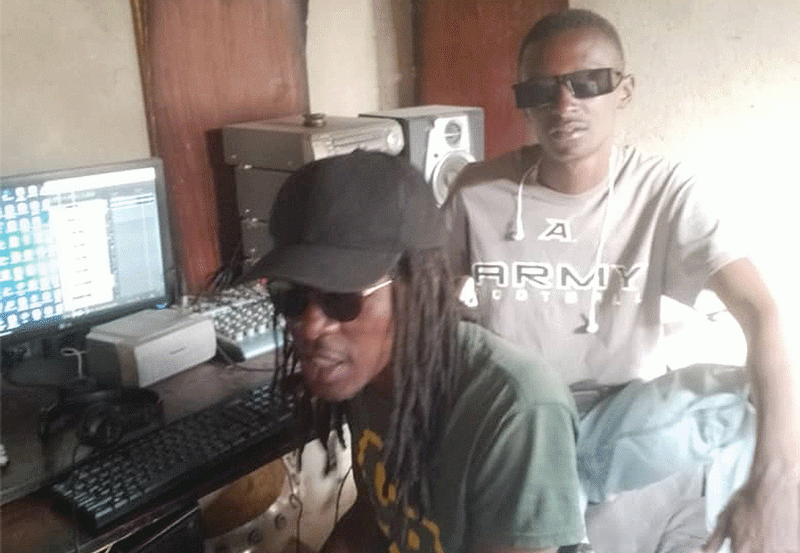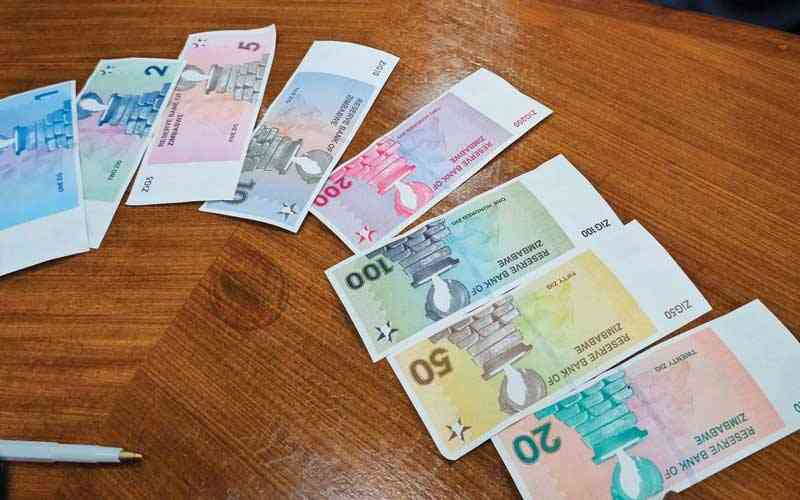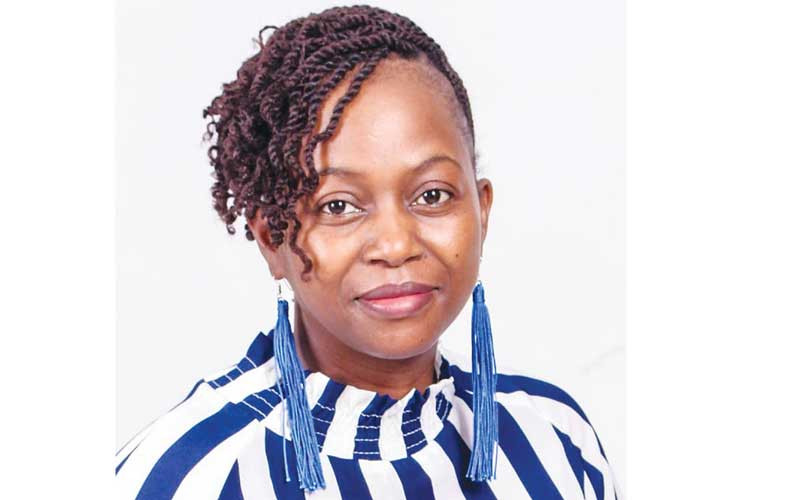
URBAN Grooves music producer Tonny Fresh’s passion for the art did not die despite losing sight in 2016.
Urban grooves music is a fusion of traditional African music, hip hop and reggae that originated in Zimbabwe in the early 2000s. The once popular genre characterised by upbeat rhythms, catchy hooks and socially-conscious lyrics has lost its popularity. It is Tonny Fresh’s dream to give a new life to the genre having mastered how to work in his condition. NewsDay Weekender recently visited the 47-year-old Tonny Fresh, born Tonderai Diza, at his backyard studio in Zengeza 3, Chitungwiza.
Early life
I was born partially blind and I feel that I worsened my condition by getting so close to the computer when reading. I used to play mbira at home with my father who encouraged me to be serious with music, but I wanted to be a lawyer. It is unfortunate that I did not perform well at school.
As someone who was partially blind, learning was not easy compared to these days where people have phones with talkback applications and they can research. I did not know about the talkback software which is now common these days.
I eventually felt that doing music was the best option. I started learning even though it was not much, the producer’s side was better. To be honest, the journey has been tough because I used other producers' studios.
I worked with a lot of artistes who include gospel singer Thembalani, dancehall chanters Guspy Warrior, Lady Squanda, Mannex, Ruso and DJ Clive before I lost sight.
Working with Guspy Warrior and Lady Squanda has been best moments because they were very good at singing.
- In the groove: How Zimbabwean artistes are celebrating Christmas 2022
- Mannex Motsi courts Hugh Masekela son in new collabo
- Nutty O dumps Zimdancehall
- Urban grooves producer’s undying passion for music
Keep Reading
The pain of losing sight
I totally lost my sight on January 7, 2016 after an eye operation at Mogenster Hospital in Masvingo. I was one of the 20 people who went for the operation and had been promised that by the next day we could see. Out of the 20, I am the only one who could not see. I was pained hearing others celebrating after removing bandages. I was told not to worry and given a tube with medicine to apply on the eye at home. That was my worst experience. After that I was not able to touch and operate my computer.
Failed efforts to produce music
I have tried to produce, but working with engineers, I started having problems. I had four engineers and felt like the journey was not going anywhere. The sound was actually dying. I could tell someone to put an effect on a track and nothing was done. I also began to lose my valuables.
Spirit rejuvenated through REAPER
When I had almost given up, I met a visually-impaired producer Tinashe Gweshe at Dorothy Duncan Centre for the Blind and Physically Handicapped in Greendale, Harare. Gweshe introduced me to a programme called Rapid Environment for Audio Production, Engineering and Recording (REAPER). It is a digital audio workstation and MIDI sequencer application created by Cockos.
This gave me the motivation to get back to the game.
I regained my confidence. Most people use it for videos, but it is now being used by blind people. It gives you access to everything.

With REAPER you can use the keyboard only without needing a mouse. We are REAPER producers, we are global.
I spent the rest of last year learning and I strongly feel that I have mastered the game. I can now do everything by myself without having to call someone to come and help me on this and that. Ah, no.
I have not done something famous yet as I have only produced for many ghetto artistes based here in Chitungwiza. I am yet to get an opportunity to record a superstar, but if one comes, I can. I was still learning a lot of things, so I never had time to engage big names. I was not even thinking about it and I was worried about quality and how we were going to co-operate.
Desire
If I get new equipment, I would be very proud. Honestly, I did not know where to go. I just heard that there are people who can assist.
My computer (Core i3) does not take heavy software. I am currently operating at a minimum rate because the machine is very small.
I also need a keyboard, if I get that, it will be a starting point. I will then work to get other equipment. Music is the only source of revenue that I am left with and I am more passionate about it. I just want to carry on with this journey.
Interest
I enjoy teaching people music, especially vocalists. When someone comes for recording, I do not just record. If the lyrics are bad, we can rewrite them together. I am very patient when it comes to that.
If your backings are not enough, I support you because it feels good to see a musician improving. I do not change your style. If your singing is bad, I simply ask you to tap on the ground or clap.
Ratings
It is indisputable that Jah Prayzah is doing well in the industry. Nutty O also has good music. He sounds like a Jamaican when singing patois and he also sings Shona very well. When it comes to producers, DJ Tamuka is the best.
Proliferation of studios
Back in the days when I produced for urban grooves artistes, having your music played on radio was something very exciting. I remember the day when my music was played, I jumped, ran and hit something in the kitchen.
I doubt if the up-and-coming musicians feel so excited these days now that there are more studios than before. However, I would say most of the studios are just demo studios where emerging artistes go to improve their art.
When one wants serious music, she or he goes to real studios such as DJ Tamuka’s. Such studios are standardised and the producers have vision.
I appreciate that some producers are even going to school to sharpen their skills.
Drug abuse
Several times I have seen some young artistes who came here visibly drunk. And I advised them not to come drunk.
That is the best way I have helped those who were serious with music to stop taking drugs.
The young artistes should stop doing that. Some are misinformed that when you smoke you sing better. Having realised that they had a music talent when still very young, did they get the talent because of taking drugs?
Your talent did not come through drugs, otherwise you will destroy it due to drug abuse.
Some have even polluted the music they sing, singing about drugs. We must be very careful with the content we produce because it is us who create that world. Even the big artistes have to be very careful.
There are, however, some artistes who are singing positively. I would say dancehall is now divided. There is street dancehall where an artiste would sing about obscene things encouraging listeners to indulge in sex and drugs.
The other side is of musicians who sing something sensible such as Freeman. When these dancehall artistes turn to conscious music, that will be a sign of reforming.
Resilience
The journey is still on. Whenever I touch the keyboard, my mind thinks of urban grooves music. I would love to work with young producers to revive this, but I won’t be producing exactly like we used to do before as I want to upgrade.
I will not turn back the hands of time. I have since produced two tracks which I did, but when I listen to them, I feel that they are demos. I will redo the tracks. I also have the vision of doing an album.
I am trying to regain my status in the industry, grow and have a state-of-the-art studio, I am still trying to get there.
There are people who still love this type (urban grooves) of music. Do you know that country music is still alive, but it is now advanced? Something definitely changed. I want to make my Kunta Records big. The Kunta idea came from the film Roots.
Before we could start playing music, there was much of foreign music played on the radio. We were emancipated through the introduction of the 75% local content policy by the government.
- Follow us no Twitter @NewsDayZimbabwe







